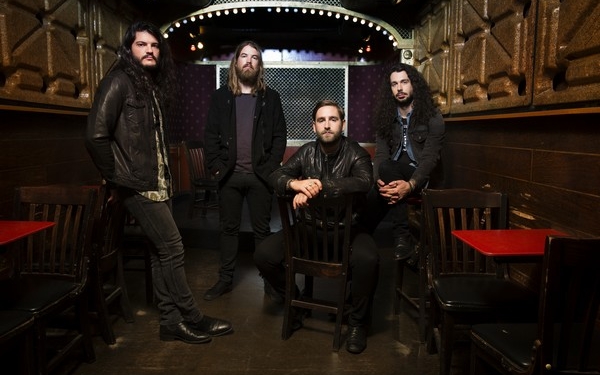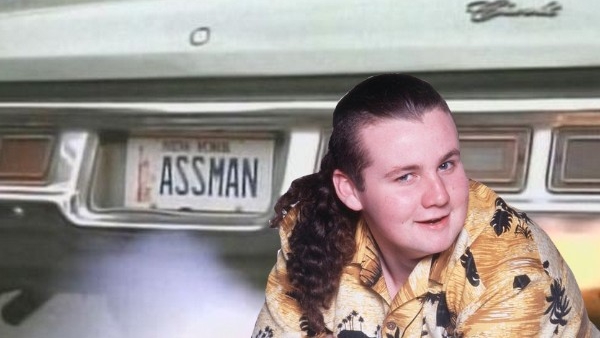Melbourne’s hardy rock’n’roll men Kingswood released their debut long player Microscopic Wars last Friday. To record the album, the hirsute four-piece nestled in at Nashville’s Blackbird Studio, which has previously captured noise from the likes of Beck, Kings of Leon and Jack White. Those are prestigious names, but did the trip overseas substantially impact upon the recorded output?
“One of the benefits of going to Nashville is you just end up in this complete bubble of creativity – especially with creative people around you – and the means to investigate any idea you want to the nth degree,” says Kingswood guitarist Alex Laska. “[That] was so pure to what our vibe was at the time. There’s no distortion or influence, apart from our own, which is perfect.”
For individuals, travelling overseas often sheds light on the overwhelming number of people coexisting on the planet. Similarly, when plying in the music industry, the smallness of one’s band is liable to induce despair. Nashville’s widely known as the home of tacky country music, but thanks to its rich musical resources, these days the Tennessee capital is populated by musicians of all orientations. So, did witnessing the scope of Nashville’s music community alarm Kingswood? Hardly.
“A philosophy we’ve had, and always will have, is we want to be the best that we can be,” Laska says. “Otherwise, why would you even bother? It’s like being a sprinter and going, ‘I’m cool with coming fifth’, when you’re training for the Olympics. It’s fine if you’ve gone as hard as you can and come fifth. That’s completely different to going, ‘I’m aiming for fifth’.”
If you’re looking for concrete evidence of the band’s inherent determination, then Microscopic Wars ought to suffice. As you’d expect from Kingswood, the 13-track sequence comprises plenty of heavy riffing, wailing vocals and cocksure guitar flourishes. Additionally, it includes sensual slow-burner I Can Feel that You Don’t Love Me, ready-made arena anthem Tremor and piano-laden power ballad Eye of the Storm.
“I think this album is pretty diverse, and it was designed to be an album,” explains Laska, the group’s key songwriter. “It’s not designed to be a bunch of cool singles. If you listen to it from the start to the end, it makes sense. If you shuffle it, it might not make that much sense. You listen to it like you’d read a book – start at the start and finish at the end.”
Ever since their breakthrough singles Yeah Go Die, Medusa and She’s My Baby were discovered by triple j unearthed in 2012, Kingswood’s hard-hitting sound has incited comparisons to rock titans Queens of the Stone Age and Led Zeppelin. Indeed, the mark of these two acts is evident throughout Microscopic Wars. However, Laska says the leading objective was to display what makes Kingswood distinct.
“There’s no doubt that they’re huge influences on our band, but this is actually our view, musically, on what sort of directions we want to go in.
“If you put on our older stuff, which thank God we never released,” he adds, “you would put that on and it would sound like Led Zeppelin, but just a really shit version of it. Obviously there’s teething problems. You’ve got to try to find what is yours and sometimes that is really obvious and evident and sometimes it’s not.”
While they haven’t exactly reinvented the wheel, Microscopic Wars reveals a band confidently marking its own path. An integral component that’s assisted with Kingswood’s considerable creative progression is the band’s receptivity to criticism.
“If there’s an ounce of credit or merit to something that someone says that may be critical, whether it’s good criticism or bad criticism, we’ll definitely investigate it. You can’t be the band that goes out and goes, ‘Fuck everyone. Everything that we do is the best thing in the world and everyone’s wrong’. That’s the dumbest thing you could possibly do. We try to be super-critical before we put things out.”
As Laska has mentioned, Microscopic Wars is intended to play as a continuous piece, rather than a compilation of unrelated songs. Thanks to the group’s internal critique mechanism, they were able to get the track sequencing just right.
“We would just make playlists and listen to them for a week and then someone would make one change and then we’d sit on that for a couple of days. It’s so much about the arcs and the lulls in how it makes you feel. I think that we’ve got it right – but what’s right and wrong?”
Ultimately that judgement isn’t up to the band. Now that the record’s entered the public domain, in many ways it’s no longer theirs. Not surprisingly, the resolutely chipper guitarist isn’t daunted by this prospect.
“We’re very interested to see how it may change the perception of the band. Whether that be positive or negative is sort of irrelevant. I think change is good.
“This first album is sort of like an official statement saying, ‘This is what we sound like and this is the direction we have going musically’. This is something we’ve been working on, we’re really proud of and excited about – I wonder what will happen.”
BY AUGUSTUS WELBY







